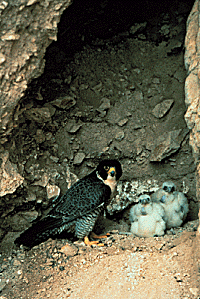![[Currents header graphic]](/homeart/currents_header.gif)
![[Currents header graphic]](/homeart/currents_header.gif)
August 4, 1997

|
|
A peregrine falcon and its chicks
|
By Robert Irion
The Santa Cruz Predatory Bird Research Group (SCPBRG), based at UCSC's Long Marine Lab, is one of 40 nonprofit organizations to receive a grant of approximately $5,000 in Geographic Information System hardware, software, and training from the Conservation Technology Support Program of Helena, Montana.
The Conservation Technology Support Program makes gifts of complete information systems to conservationists across the country following a rigorous application procedure. The program is a partnership among companies that donated more than $1 million worth of products to make the grants possible. The companies include Hewlett-Packard, Apple Computer, and the Environmental Systems Research Institute.
According to SCPBRG researcher Brian Latta, "We now will be able to analyze graphically the distribution of peregrine falcons we have banded over the past 20 years, as well as describe the microhabitat preferences of eagles we are tagging with satellite transmitters."
The SCPBRG already is making good use of the grant, plotting the movements of a subadult bald eagle fitted with a satellite transmitter. Latta tagged the eagle in February at Silverwood Lake in southern California's San Bernardino Mountains. Data from the tag show that the bird is summering along the Athabasca River in central Alberta, Canada.
In addition, SCPBRG researchers are analyzing data from peregrine falcon bandings and nest sites, compiled during the group's successful restoration of the falcon in California over the past two decades. The team will use a digital camera, acquired via the new grant, to record data on nest site habitats and the nesting cliffs that peregrines use.
The peregrine falcon has proven an important indicator of persistent chemical pollution in the environment, said SCPBRG researcher Janet Linthicum. "The GIS technology will allow us to gather more sophisticated information and provide better data to state and federal agencies as we monitor the peregrine's recovery," she said.
The SCPBRG raised peregrine falcons at its former captive breeding facility on the UCSC campus and released more than 800 of the birds in a successful recovery effort for California, Oregon, and Nevada. Team researchers are considered experts on predatory bird management and the recovery of endangered species in the American West.
Fred Silverman, vice president for worldwide community affairs at Apple Computer, said of the grants, "Tools like these can help smaller organizations increase their impact on key environmental issues."
Other groups among the 40 selected to receive Conservation Technology Support Program grants were the National Wildlife Federation's Northeast Natural Resource Center in Vermont, the Sierra Club Legal Defense Fund in Denver, the Teton Science School in Wyoming, and the Wildlands Project in Salt Lake City.